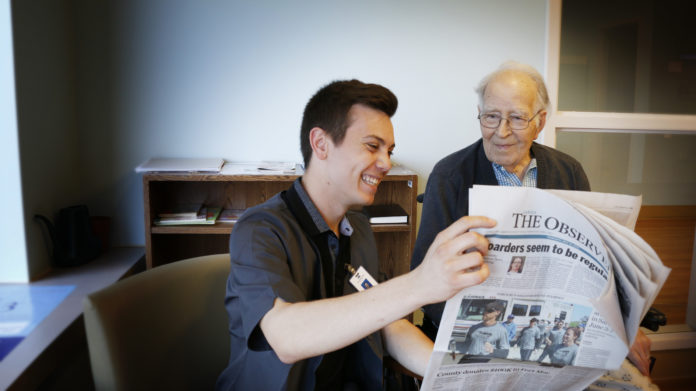An injury or illness requiring a hospital stay can be overwhelming – for an elderly patient and his or her family caregivers. During a hospital stay, older patients with visual or hearing loss, mobility or cognitive challenges, dehydration or poor nutrition are more prone to develop sudden confusion, fluctuations in mental status, disorganized thinking or inattention (all of which are symptoms of delirium*).
The Hospital Elder Life Program (HELP) at Bluewater Health in Sarnia, ON uses early intervention – based on research from the Yale University School of Medicine – to help patients more than 70 years old return to their homes or previous living situations after being hospitalized, with the same or better ability to function.
Skilled staff and trained volunteers carry out activities (orientation; therapeutic activities such as reading a newspaper, playing cards or one-on-one discussion; exercise or mobility; helping with tray set-up at meals and encouraging fluid intake; and hearing and vision adjustments) targeted at delirium risk factors. In addition to reducing the incidence of delirium by 34 per cent in trials, HELP has been shown to improve consistency and quality of care and patient safety, helping patients avoid falls, pressure sores, and other issues sometimes experienced during hospitalization.
“Personal attention and support are caring services valued by patients and their families, leading to better patient outcomes and satisfaction,” says Jody McGregor, Elder Life Specialist, Bluewater Health. “HELP reduces falls, mental and functional decline, and unplanned hospital readmissions while providing a constructive, concrete experience to prepare families, communities, and our healthcare system for our aging society.”
Reducing the risk of and caring for delirium
“Delirium is common and usually temporary,” says Jenn Mackey, Manager, Inpatient Rehabilitation, Bluewater Health. “In hospital and at home family members and caregivers can play an important role in preventing – and caring for a person with – delirium.”
Prepare a medical information sheet that lists all known medical conditions, allergies and medications, names and phone numbers of physicians, and the name of your loved one’s usual pharmacy. Make sure glasses, hearing aids, and dentures are up to date and in good working order. Help orient your loved one throughout the day in a calm and reassuring tone of voice, and when giving instructions, state one simple task at a time. Consider soothing activities such as massage for your loved one. Learn more about delirium, and tell a healthcare provider immediately if you notice any symptoms of delirium. Family members are often the first to notice subtle changes.
If your loved one is showing symptoms of delirium, have a family member, caregiver, or friend stay with him or her as much as possible, especially when the confusion is severe. Help maintain a quiet and peaceful setting. Make sure the lighting is good but not too bright and play soothing music. Make sure your loved one’s glasses are clean and fit well and hearing aid batteries are fully charged. Keep your loved one mobile as much as possible, and eating and drinking. Talk to your loved one about delirious episodes to help lessen the anxiety, fear, frustration, or anger that might otherwise develop.
* Delirium is a sudden, temporary onset of confusion that can fluctuate causing changes in the way people think and behave. While delirium occurs more often in older people, it can develop at any age. It is important to note that delirium is not dementia.


